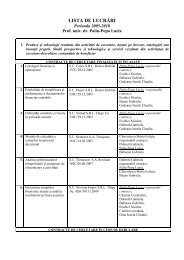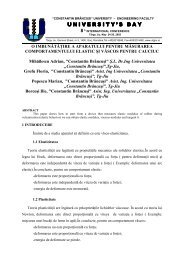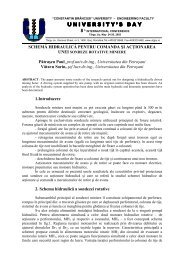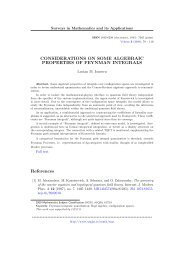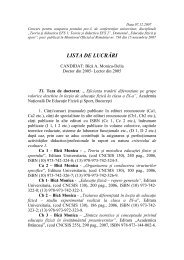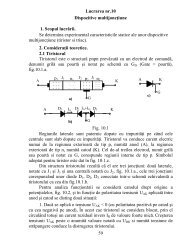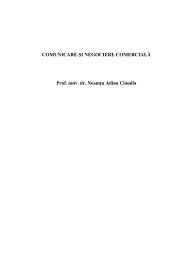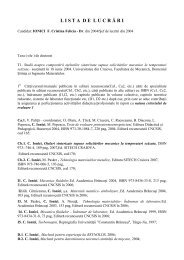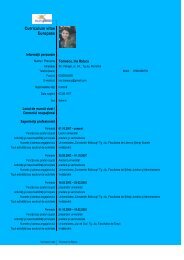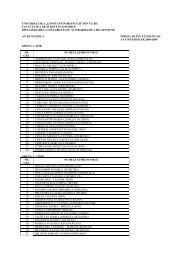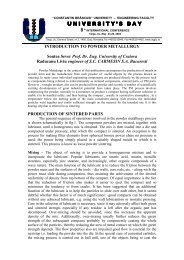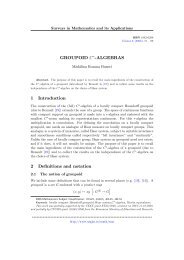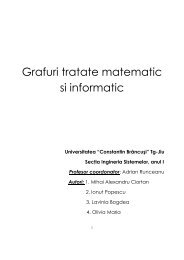NO. 2 / 2008 - Universitatea "Constantin BrâncuÅi"
NO. 2 / 2008 - Universitatea "Constantin BrâncuÅi"
NO. 2 / 2008 - Universitatea "Constantin BrâncuÅi"
Create successful ePaper yourself
Turn your PDF publications into a flip-book with our unique Google optimized e-Paper software.
Analele Universităţii “<strong>Constantin</strong> Brâncuşi” din Târgu Jiu, Seria Litere şi Ştiinţe Sociale, Nr. 2/<strong>2008</strong>pseudo-obiectivarea judecăţilor, chiar aşaredus emise în sloganurile care sunt fie scrise,fie strigate prin porta-vocea din autoturismelecare străbat cărările patriei, într-o neostoităsete de persuadare a publicului.Ca specie de discurs, sloganulaparţine epicii ocazionale, descinzând dinpragmatică şi retorică, prima fiindpredominant descriptivă (formal şi funcţional)şi interesată de mecanismele obiective derealizare a proceselor comunicative, iar adoua, predominant evaluativă, definindu-şiconţinutul în raport cu nivelurile la care sedistribuie mesajele transmise. În retorică, sedistinge între logos( componenta ideatică),ethos (componenta credibilităţii, legată deimaginea de sine) şi pathos( componentalegată de reacţia emotivă). Dintre acestea,supralicitat este, în sloganul de campanie,ethosul şi, mai slab, pathosul, deoarece fondulideatic este, doar în unele cazuri, reprezentat,cel mai adesea, autorii textelor ignorându-l.Mai mult, retorica modernă are, în momentulactual, caracterul unei tranzacţii, accentuândrolul acesteia pentru discursul situat( produsîntr-o anumită circumstanţă), interlocutorulfiind implicat, ca actor al acestui scenariu( ase vedea, pentru aceasta, strategiile lingvisticela care se recurge spre atragerea electorului) .Sloganul este un discurs ocazional, favorizatde circumstanţele electorale, care constituiesursa şi temeiul generării lui, reprezentândformula lingvistică selectată pentru a revela,succint, calităţile unui candidat sau beneficiileopţiunii publicului pentru un anumit partid.Ca schemă de discurs persuasiv, sloganulpresupune un emiţător/ persuadator, cel maiadesea altul decât candidatul( acesta rămâneexterior ), un receptor/ persuadat, asupracăruia se revarsă tot conţinutul semantic almesajului/ persuasiunii, sens în care se poatevorbi de caracterul de text de spectacol alsloganului.Pentru cercetarea noastră, am consideratnecesară prezentarea modalităţilor discursive,admise în pragmatică, în funcţie de poziţialocutorului, chiar dacă, în cazul sloganuluipolitic, se poate vorbi, cum am nuanţat, de doilocutori: unul care creează textul, altul care şilasumă; astfel, modalitatea alocutivă(on highlighting the own credibility and onthe pseudo-objectiveness of the judgment,really diminished in the written or spokenslogans, in an attentive to convince thecrowds.Regarding the type of the speech,the slogan belongs to the casual epic, and itcomes from the pragmatics and rhetoric, thefirst one is mainly descriptive ( formal andfunctional) and interested on the objectivemechanisms of accomplishing thecommunicative processes, and the second onis mostly assessable, it defines its content incomparison with the levels where there aredistributed the sent messages. In the rhetoricthere is a difference between logos( thecomponent regarding the ideas), and theethos( the component referring thecredibility, referring the self image) andpathos( the component referring theemotional reaction). Out of these ones,mostly used in the campaign slogans theethos , and less the pathos, due the fact thatthe idea base is rarely represented due to thefact that more often the authors of the textsignore it. More than that the modern rhetoriccurrently has the feature of a transaction, byhighlighting its role for the specializedspeech (produced in a certain circumstance),as the interlocutor is involved, as an actor ofthis script ( see the linguistics strategies theyare using for drawing the elector) .The slogan is a casual speech, favored byelective circumstances, that constitutes thesource and the base of its generating; itrepresents the linguistic formula selected inorder to reveal, the qualities of a candidateor the benefits of the public’s option for acertain party. As an example of a persuasivespeech the slogan supposes a transmitter /persuasive, most often the candidate (heremains in the exterior), a receiver /persuasive, who receives all the semanticcontent of the message, this is when we cantalk about the feature of a spectacle text ofthe slogan.We consider it necessary for ourresearch, the presentation of the speechmodalities, admitted by the pragmaticsdepending on the position of the interlocutorAnnals of the „<strong>Constantin</strong> Brâncuşi” University of Târgu Jiu, Series Letters and Social Sciences, No. 2/<strong>2008</strong>26



